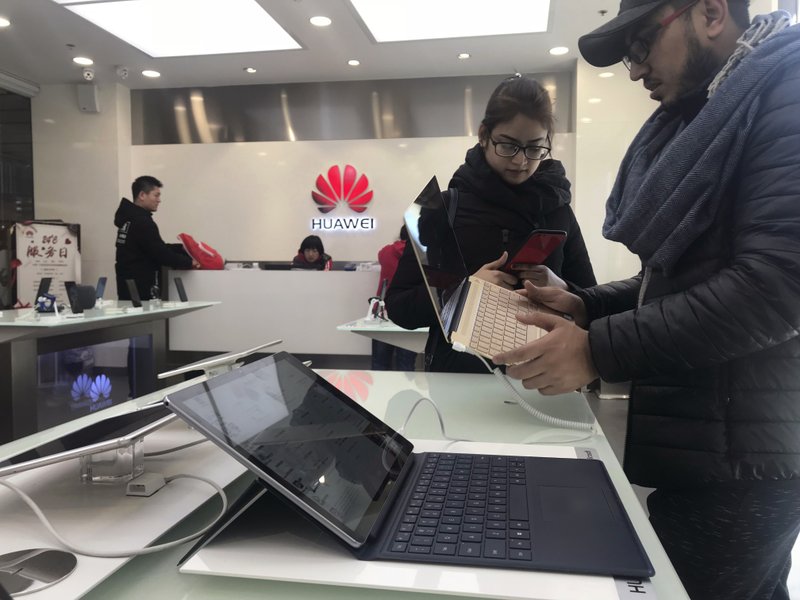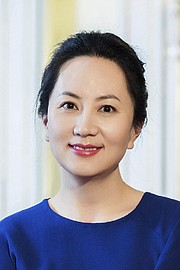WASHINGTON -- The arrest of a top executive at one of the most successful Chinese global companies threatens to upend a delicate detente between the U.S. and China in its monthslong trade war.
As President Donald Trump was arranging a trade truce with President Xi Jinping of China over dinner Saturday night in Argentina, his administration was coordinating the arrest of Huawei's chief financial officer, who was flying through Canada.
The arrest of Meng Wanzhou heightened skepticism about the trade truce that Trump and Xi reached last weekend. On Thursday, U.S. stock markets tumbled on fears that the 90-day cease-fire won't last before regaining most of their losses by the close of trading.
Huawei, the world's biggest supplier of network gear used by phone and Internet companies, has long been seen as a front for spying by the Chinese military or security services, whose cyber-spies are widely acknowledged as highly skilled. A U.S. National Security Agency cybersecurity adviser, Rob Joyce, last month accused Beijing of violating a 2015 agreement with the U.S. to halt electronic theft of intellectual property.
Other nations are increasingly being forced to choose between Chinese and U.S. suppliers for next-generation "5G" wireless technology. Washington has been pushing other countries not to buy the equipment from Huawei, arguing that the company may be working stealthily for Beijing's spymasters.
Meng was detained by Canadian authorities in Vancouver as she was changing flights Saturday. The Globe and Mail newspaper, citing law enforcement sources, reported that Meng is suspected of trying to evade U.S. sanctions on Iran. She faces possible extradition to the United States, according to Canadian authorities.
White House officials, including John Bolton, the national security adviser who attended the dinner with Trump and Xi, knew of the impending arrest. So did a leading Senate Republican and Democrat. But it is unclear whether Trump knew. And Xi was apparently never told at the dinner.
Beijing protested the arrest but signaled that it doesn't want to disrupt progress toward settling its trade dispute with the Trump administration. Chinese Commerce Ministry spokesman Gao Feng said China is confident it can reach a deal during the 90 days that Trump agreed to suspend a scheduled increase in U.S. import taxes on Chinese products.
In the view of the United States and many outside analysts, China has embarked on an aggressive drive to overtake America's dominance in technology and global economic leadership. According to analysts, China has deployed predatory tactics, from forcing American and other foreign companies to hand over trade secrets in exchange for access to the Chinese market to engaging in cyber-theft.
The Commerce Department said Thursday that record imports in October drove the U.S. trade deficit to the highest level in a decade.
The gap between what the United States sells and what it buys from foreign countries hit $55.5 billion in October, the fifth-straight increase and highest since October 2008.
The politically sensitive deficit in the trade of goods with China rose 7.1 percent to a record $43.1 billion. The goods gap with the European Union widened 65.5 percent to a record $17.6 billion.
Led by shipments of medicine and cars, overall imports rose 0.2 percent to a record $266.5 billion. Exports fell 0.1 percent to $211 billion.
Trump campaigned on a pledge to slash America's long-standing trade deficit with the rest of the world. Despite his import taxes on steel, aluminum and Chinese goods, the deficit so far this year is running 11.4 percent above January-October 2017.
U.S. exports of soybeans, targeted for retaliatory tariffs by China, dropped 46.8 percent in October.
Washington also regards Beijing's ambitious long-term development plan, "Made in China 2025," as a scheme to dominate such fields as robotics and electric vehicles by unfairly subsidizing Chinese companies and discriminating against foreign competitors.
In addition to Trump's tariffs, the administration is tightening regulations on high-tech exports to China. It is also making it harder for Chinese firms to invest in U.S. companies or to buy American technology in such cutting-edge areas as robotics, artificial intelligence and virtual reality.
Earlier this year, the United States nearly drove Huawei's biggest Chinese rival, ZTE Corp., out of business for selling equipment to North Korea and Iran in violation of U.S. sanctions. But Trump issued a reprieve, possibly in part because the U.S. tech companies are major suppliers of the Chinese giant and also would have been harmed. ZTE got off with paying a $1 billion fine, changing its board and management and agreeing to let American regulators monitor its operations.
The U.S. and Chinese tech industries depend on each other so much for components that "it is very hard to decouple the two without punishing U.S. companies, without shooting ourselves in the foot," said Adam Segal, cyberspace analyst at the Council on Foreign Relations.
British Telecom said this week that it would stop using Huawei equipment in its 5G network, the BBC reported, and U.S. lawmakers have lobbied Canada's prime minister to freeze out the Chinese supplier. New Zealand and Australia already have, according to news reports. Other, less wealthy nations are concerned less about spying and more about low prices, which plays to Huawei's advantage.
And nearly a year ago, AT&T pulled out of a deal to sell Huawei smartphones.
Huawei and ZTE have not only been barred from use by U.S. government agencies and contractors; they have also been mostly locked out of the American market. A 2012 report by the House Intelligence Committee urged U.S. businesses to avoid their products and called for blocking all mergers or acquisitions involving them.
U.S. officials have raised questions about how closely tied the two companies are to Chinese security agencies and the People's Liberation Army. The founder of Huawei and Meng's father, Ren Zhengfei, is a former army engineer who has become one of China's most successful entrepreneurs.
Priscilla Moriuchi, a former East Asia specialist at the National Security Agency now with the cybersecurity firm Recorded Future, said both ZTE and Huawei are wedded to China's military and political leadership.
"The threat from these companies lies in their access to critical Internet backbone infrastructure," she said.
Meng's arrest, significant because of her elite connections and prominent corporate position, triggered shock in China. The arrest is doubly sensitive because it threatens the rise of one of China's top cutting-edge brands, now the world's second-largest smartphone company, surpassing Apple in sales this year.
Information for this article was contributed by Paul Wiseman, Frank Bajak, Rob Gillies and Joe McDonald of The Associated Press; by Robyn Dixon of the Los Angeles Times; and by Edward Wong of The New York Times.
A Section on 12/07/2018

